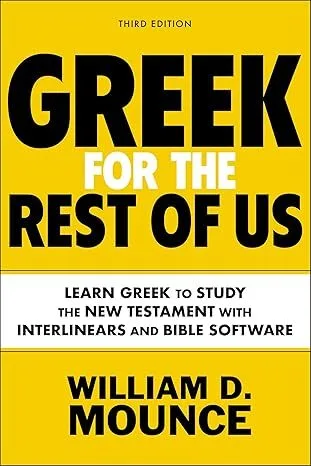Strong’s G4274: From pro (before) and dromos (a course), πρόδρομος denotes one who runs ahead, a forerunner or precursor. In biblical context, it specifically refers to Christ who has entered heaven as our forerunner, preparing the way for believers to follow.
U- Unveiling the Word

Key Information
πρόδρομος

Strong’s Entry
g4274
Πρόδρομος carries the rich imagery of one who runs ahead to prepare the way or scout the path. As a compound word, it combines προ (before) with δρόμος (a course or running), creating a vivid picture of a pioneer or scout. In the New Testament, it appears uniquely in Hebrews 6:20, where it describes Jesus as our forerunner into heaven’s holy place. Early church fathers extensively used this term to emphasize Christ’s pioneering work in salvation, opening the way for believers to follow. Today, this word continues to powerfully illustrate Christ’s role in securing our access to God’s presence and preparing our eternal dwelling.
N – Necessary Information
- Greek Word: πρόδρομος, prodromos, /pro’dromos/
- Detailed pronunciation: pro (as in “professional”) + dro (as in “drone”) + mos (as in “moss”)
- Part of Speech: Noun/Adjective
Etymology:
- προ- (pro-): prefix meaning “before” or “ahead”
- δρόμος (dromos): root noun meaning “course” or “running”
- -ος (-os): nominal suffix forming a substantive
D – Defining Meanings
- Forerunner
- Scout
- Pioneer
- One who goes ahead
- Precursor
For compound words:
The prefix προ- adds the temporal and spatial concept of “before” or “ahead” to δρόμος (running/course), while the -ος suffix makes it a nominal form, creating the meaning of “one who runs ahead” or “one who goes before.”
Translation Options:
- “forerunner” – best captures both the movement and preparatory aspects
- “pioneer” – emphasizes the aspect of preparing the way
- “precursor” – highlights the sequential nature of the role
E – Exploring Similar Words
- πρόσκοπος (proskopos) /pro’skopos/ – lookout or scout, emphasizing watching rather than running
- προηγούμενος (proēgoumenos) /pro-ē-gou’menos/ – one going before, emphasizing leading rather than running
- πρωτότοκος (prōtotokos) /prō-to’tokos/ – firstborn, emphasizing position rather than function
R – Reviewing the Word’s Morphology
As a masculine noun/adjective of the second declension, πρόδρομος follows these patterns:
- Case: Nominative, Genitive, Dative, Accusative
- Number: Singular, Plural
- Gender: Masculine
- Declension: Second
Examples in English would be:
- Nominative (subject): the forerunner
- Genitive (possession): of the forerunner
- Dative (indirect object): to/for the forerunner
- Accusative (direct object): the forerunner
S – Studying Lexicon Insights
BDAG emphasizes its military and athletic usage, particularly in the context of scouts or advance guards. Thayer’s notes its use in the Septuagint for early figs and first fruits. LSJ provides examples from classical Greek where it refers to advance troops or early seasonal phenomena. Vine’s connects it specifically to Christ’s high priestly ministry. Strong’s highlights its compound nature. LEH notes its use for agricultural firstfruits. Moulton and Milligan document its use in papyri for agricultural and military contexts.
T – Tracing the Scriptures
First Appearance:
Where Jesus has entered as a [πρόδρομος] forerunner for us, having become a high priest forever according to the order of Melchizedek. Hebrews 6:20
Additional References:
This is the only occurrence in the New Testament.
A – Analyzing Classical Usage
| Author: Work | Text |
|---|---|
| Herodotus: Histories | The [πρόδρομος] advance scouts reported the enemy’s position to the main army |
| Xenophon: Anabasis | The [πρόδρομος] forerunners of spring appeared with the first blooming flowers |
| Thucydides: Peloponnesian War | The [πρόδρομος] advance guard secured the passage through the mountain pass |
N – Noteworthy Summary
Πρόδρομος beautifully captures Christ’s role as our pioneer into God’s presence. Just as ancient scouts would go ahead to prepare the way for others, Jesus has entered heaven’s holy place ahead of us, securing our access to God. This profound truth proclaims the good news that our way to God has been opened and secured by Christ Himself. We can follow with confidence because our forerunner has already blazed the trail and prepared our eternal dwelling.
D – Did You Know?
- In ancient Greek warfare, πρόδρομος referred to light cavalry units that would scout ahead of the main army.
- The term was used in agricultural contexts for early-ripening fruits, symbolizing the promise of the full harvest to come.
- In ancient Greek athletic contests, a πρόδρομος was sometimes used to set the pace for longer races.
Strong’s G4274: From pro (before) and dromos (a course), πρόδρομος denotes one who runs ahead, a forerunner or precursor. In biblical context, it specifically refers to Christ who has entered heaven as our forerunner, preparing the way for believers to follow.
Part of speech: Noun/Adjective
Tags: forerunner, pioneer, Christ, heaven, preparation, access to God, compound noun, second declension, masculine, priesthood, Melchizedek, path-maker
Note: While this entry strives for accuracy, readers engaged in critical research should verify citations and keyword occurrences in their Bible translation of choice. For Biblical citations, the F.O.G Bible project recommends Logos Bible software.
Strong's g4274




